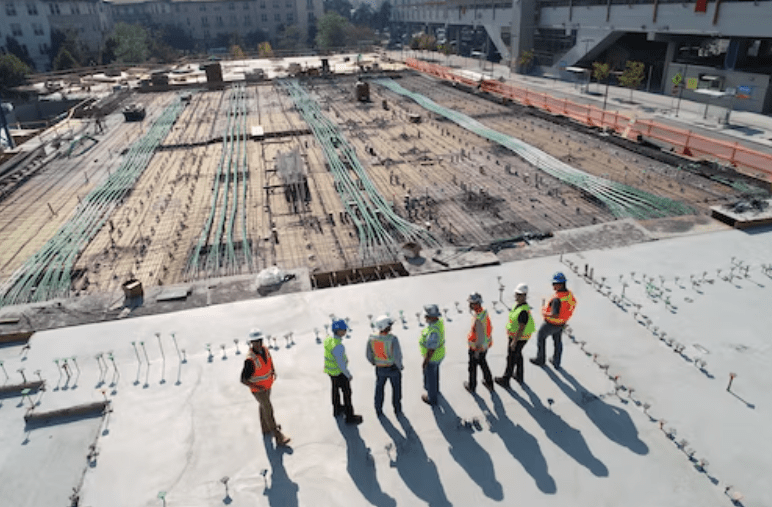In the ever-evolving world of construction, the success of a project hinges on effective management. This sphere of expertise encompasses a wide range of skills and tools, ensuring that projects are completed on time, within budget, and to the required quality standards.
This article delves into the key components that underpin effective construction project management.
1. Comprehensive Planning and Scheduling
At the heart of effective construction project management lies comprehensive planning and scheduling. This initial stage sets the groundwork for the entire project, outlining the scope, objectives, timelines, and resources required.
A detailed project plan, often created using sophisticated software, helps in breaking down the project into manageable tasks, assigning responsibilities, and setting deadlines.
Scheduling, a critical component of planning, involves creating a timeline for the project’s completion. Effective scheduling ensures that resources are allocated efficiently, deadlines are realistic, and potential bottlenecks are identified early.
This proactive approach minimizes delays and disruptions, which are common in construction projects. Moreover, it allows for flexibility, accommodating unforeseen changes without derailing the overall project timeline.
2. The Impact of Educational Advancement
The construction industry, like many others, is rapidly evolving with technological advancements and changing regulatory landscapes. In this context, the benefits of pursuing higher education, such as an online construction management degree, cannot be overstated.
This specialized education equips professionals with the latest knowledge and skills in project management, sustainable construction practices, and regulatory compliance.
A management degree in construction offers flexibility, allowing professionals to balance their work and studies. It broadens their understanding of advanced project management techniques, risk management, and cost control, all crucial for effective construction project management.
This educational pursuit also enhances career prospects, opening doors to higher positions and better pay.
3. Effective Communication and Stakeholder Management
Effective communication is a cornerstone of successful construction project management. It involves clear and consistent exchange of information among all stakeholders, including clients, contractors, suppliers, and team members.
Good communication ensures that everyone is on the same page, reducing misunderstandings and conflicts.
Stakeholder management is equally important. It involves identifying all parties impacted by the project and understanding their needs and expectations.
Effective stakeholder management helps in building trust, securing buy-in, and ensuring that the project aligns with the interests of all involved parties.
4. Budget Management and Financial Oversight
Budget management is a critical aspect of construction project management. It involves estimating costs, securing funding, and controlling expenses throughout the project. Effective budget management ensures that the project remains financially viable and prevents cost overruns.
Financial oversight extends beyond mere budgeting. It includes regular monitoring of expenditures, ensuring that funds are allocated effectively and efficiently. This financial vigilance helps identify potential financial issues early, allowing for timely interventions to keep the project on track.
5. Quality Control and Safety Standards
Quality control in construction project management ensures that the work meets or exceeds the project specifications and industry standards. It involves regular inspections and audits to check the quality of materials and workmanship. Maintaining high-quality standards is essential for the longevity and safety of the construction.
Safety is paramount in construction projects. Effective management entails strict adherence to safety standards and regulations, providing safety training to workers, and ensuring a safe working environment. This focus on safety minimizes accidents and ensures the well-being of all workers on site.
6. Advanced Technology and Digital Tools (200+ words)
In the modern era of construction, the integration of advanced technology and digital tools is pivotal for effective project management. These technologies range from Building Information Modeling (BIM) to advanced project management software, providing a digital representation of the physical and functional characteristics of a project.
BIM, for instance, allows for more accurate planning and visualization of the project in a 3D format, improving decision-making throughout the construction process. It also facilitates better coordination among various stakeholders by providing a shared knowledge resource.
On the other hand, project management software streamlines task allocation, progress tracking, and communication, enhancing overall efficiency.
The use of drones for site surveying and monitoring has also become prevalent. They provide real-time data and aerial imagery, essential for keeping projects on track and identifying issues early on.
Additionally, technologies like augmented reality (AR) and virtual reality (VR) are transforming the way stakeholders visualize and interact with the project before actual construction begins, aiding in better planning and design.
7. Environmental Sustainability and Green Building Practices (200+ words)
Environmental sustainability is increasingly becoming a key component in construction project management. With a growing emphasis on reducing the environmental impact of construction activities, implementing green building practices is not just an ethical choice but also often a regulatory requirement.
Sustainable construction involves using eco-friendly materials, efficient waste management, and energy-saving methods. It aims to minimize the carbon footprint of construction activities and create buildings that are energy-efficient and environmentally responsible.
This approach not only contributes to environmental conservation but also leads to long-term cost savings through reduced energy consumption and maintenance costs.
Green building certifications, like LEED (Leadership in Energy and Environmental Design), have become significant benchmarks in the industry. Achieving these certifications requires a comprehensive approach to sustainability, covering aspects like water efficiency, energy use, indoor environmental quality, and material selection.
Conclusion
Effective construction project management is a complex and multifaceted endeavor, necessitating not only comprehensive planning and educational advancement but also strong communication, stringent budget management, and an unwavering commitment to quality and safety.
Additionally, the incorporation of advanced technology and digital tools, along with a dedicated focus on environmental sustainability and green building practices, elevates the efficiency and effectiveness of construction projects.
Embracing these elements ensures that projects are not only completed within the constraints of time and budget but also achieve high standards of quality while positively contributing to environmental stewardship. This holistic approach is crucial for the success and sustainability of modern construction projects, paving the way for innovative, efficient, and responsible construction practices.

